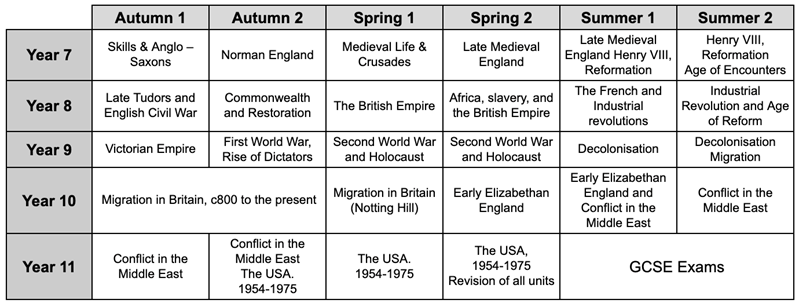HISTORY
Curriculum Purpose
Preparing students for life after school
Our curriculum and lessons will allow students to become historically informed critical thinkers, who can analyse information, question, reason and communicate effectively, thereby supporting success across a wide range of careers. To do this, our students will achieve a P8 score of +1.
A thorough academic History education will equip pupils with knowledge which allows them to interact academically with others engaged in the study of the past; it will also allow them to better understand the concerns and priorities of a wide range of people, navigating the modern world with confidence and success. Above all our curriculum will instil in our pupils a love for historical study while supporting the development of intellectually curious minds which are accustomed to questioning evidence and probing assumptions.
Knowledge acquisition as a measure of progress
Our curriculum and lessons will give students the knowledge to understand, analyse, evaluate and critically synthesise information relating to history.
The needs of our community
Our curriculum and lessons will support the community of students within our school and actively challenge inequalities, both by exploring historical injustices and by examining the experiences of previously marginalised groups. Pupils at Trinity Academy will experience a History curriculum which not only explores the lives and actions of traditional elites but also examines the experiences of Black and Minority Ethnic Groups, women, the working classes and the LGBT+ community. This will be achieved through dedicated lessons and topics within the curriculum and through wider school events.
Teaching History for its intrinsic value
We believe that the world is an amazing place and that the study of History shows us how amazing it is. Our curriculum and lessons will introduce students to a wide range of human achievements and follies, helping them to appreciate the richness of the human experience and to guard against the misuse and distortion of History for the furtherance of destructive objectives. Our curriculum will develop in all students a rich insight into the past which will allow them to understand their own ideas and experiences within the contexts of local, nation and international developments, both distant and more recent.
Curriculum Rationale
What do we teach and why do we teach it?
The selection of topics in history is naturally quite contentious, not least because there is so much to choose from. We have made the decision to teach topics that enable students to construct a narrative history of Britain and its relationship with the wider world while learning about causation, change and continuity, chronology, evidence, interpretation and significance. We also deepen their understanding of key substantive concepts, particularly the changing nature of government, religion and religious conflict, imperialism and the struggle for rights and freedoms. These concepts are the through lines that connect our topics together as we move from medieval to modern history. We also try to ensure that our topics provide representation for our cohort. Our aim is that when students encounter another culture in history, this is never solely through the lens of persecution or conflict but also includes a celebration of other cultures.
Why do we teach it in that order?
To some extent the sequencing is done for us in history in that we teach chronologically. However, we have also sequenced our key substantive concepts (described above) through the curriculum. Each time we revisit one of these concepts, we draw explicit links back to previous encounters we have had with them and we delve into more complex aspects of those concepts. So for instance, we teach students about systems of government through the feudal system in Year 7 and then revisit it in a much more sophisticated way when we introduce parliamentary democracy in Year 8, moving onto conflicting political ideologies and totalitarian dictatorships in Year 9.
Curriculum Overview

